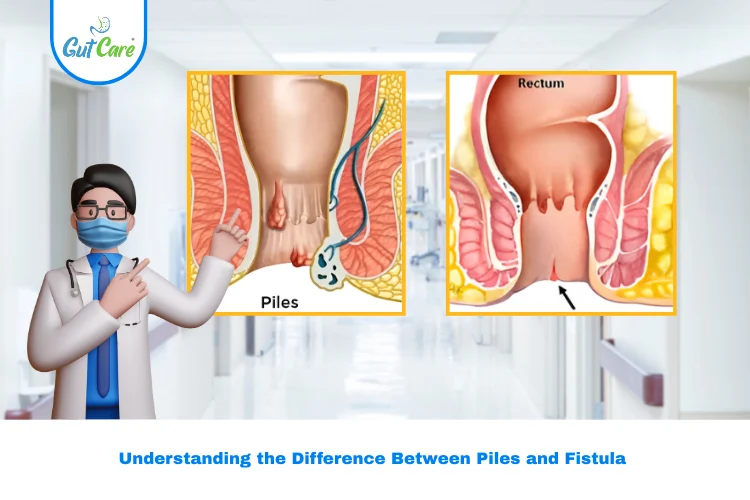Understanding the difference between piles and fistula is crucial for effective treatment and relief. Both are common anorectal disorders that affect millions worldwide, yet they have distinct causes, symptoms, and management approaches. If you are experiencing discomfort in the anal region, visiting a specialist like proctologist Dr. Yuvrajsingh Gehlot can provide accurate diagnosis and tailored treatment. At Gutcare Clinics in Bangalore, patients can consult a piles specialist doctor for comprehensive care.
In this article, we will break down the difference between piles and fistula, highlight symptoms, causes, and discuss treatment options to guide you toward relief.
What Are Piles?
Piles, also known as hemorrhoids, are swollen veins in the lower rectum and anus. They can develop inside the rectum (internal piles) or under the skin around the anus (external piles).
Symptoms of Piles
- Pain or discomfort during bowel movements
- Itching around the anal area
- Swelling or lumps near the anus
- Bright red blood on stool or toilet paper
- Leakage of mucus in severe cases
Causes of Piles
- Chronic constipation or diarrhea
- Straining during bowel movements
- Sedentary lifestyle
- Pregnancy due to increased pressure in pelvic veins
- Obesity or poor dietary habits
Treatment Options for Piles
- Lifestyle modifications, including high-fiber diet and increased water intake
- Topical ointments and medications to reduce inflammation
- Non-surgical procedures like rubber band ligation
- Surgery in severe cases, performed by an experienced piles specialist doctor
What Is Fistula?
A fistula is an abnormal tunnel or tract that forms between the anal canal and the skin near the anus. Unlike piles, fistula develops as a result of infection or abscess.
Symptoms of Fistula
- Persistent pain and swelling around the anus
- Discharge of pus or blood from the opening near the anus
- Irritation and redness around the anal region
- Recurrent abscess formation
- Fever in severe infections
Causes of Fistula
- Anal abscess that fails to heal properly
- Crohn’s disease or other inflammatory bowel diseases
- Trauma or injury to the anal region
- Tuberculosis (rare)
Treatment Options for Fistula
Fistula rarely heals on its own and usually requires medical intervention:
- Surgical procedures like fistulotomy or seton placement performed by a colorectal surgeon
- Antibiotics to control infection (as supportive therapy)
- Regular follow-ups to ensure proper healing
Key Differences Between Piles and Fistula
| Feature | Piles | Fistula |
| Definition | Swollen veins in the anal canal | Abnormal tunnel between anal canal and skin |
| Cause | Straining, constipation, pregnancy | Infection, abscess, Crohn’s disease |
| Symptoms | Bleeding, itching, pain, swelling | Pain, pus discharge, recurrent abscess |
| Treatment | Lifestyle changes, medications, surgery | Surgical intervention, antibiotics |
| Specialist | Piles specialist doctor, proctologist | Colorectal surgeon, proctologist |
Understanding these differences helps patients avoid misdiagnosis and seek the correct treatment promptly.
When to Consult a Doctor
It is vital to consult a qualified medical professional if symptoms persist or worsen. Conditions like fistula require timely surgery to prevent complications, while severe piles may require surgical intervention. For residents in Bangalore, Gutcare Clinics offers expert consultation with piles doctors in Bangalore to ensure personalized care.
Preventive Measures for Piles and Fistula
While some causes cannot be entirely avoided, adopting healthy habits reduces the risk:
- Eat a high-fiber diet and drink plenty of water
- Avoid straining during bowel movements
- Maintain good hygiene in the anal area
- Regular physical activity to improve blood circulation
- Seek early treatment for anal infections or abscesses
Summary
Understanding the difference between piles and fistula is essential for proper treatment. Piles are swollen veins often caused by lifestyle factors, while fistula is an infection-related abnormal tract requiring surgical care. Consulting a piles specialist doctor or a colorectal surgeon ensures accurate diagnosis and treatment. At Gutcare Clinics, Bangalore, experienced doctors like Dr. Yuvrajsingh Gehlot provide comprehensive care to manage these conditions effectively.
If you notice persistent pain, bleeding, or unusual discharge around the anal area, do not ignore it. Early intervention by a qualified professional can prevent complications and provide long-term relief.
FAQs On Difference Between Piles and Fistula
1. What is the main difference between piles and fistula?
The main difference lies in their causes: piles are swollen veins, while fistula is an abnormal tunnel caused by infection or abscess. Treatment approaches also differ, with fistula often requiring surgery.
2. Can piles turn into a fistula if untreated?
No, piles do not turn into fistula. They are separate conditions, though both affect the anal region. Fistula usually develops after an abscess or infection.
3. Who is the best doctor to consult for piles in Bangalore?
For piles, you can consult a piles specialist doctor or a piles doctor in Bangalore. At Gutcare Clinics, Dr. Yuvrajsingh Gehlot specializes in both piles and other anorectal disorders.
4. Are there home remedies to manage piles and fistula?
Home remedies like a high-fiber diet, warm sitz baths, and proper hygiene can relieve piles temporarily. Fistula generally requires surgical treatment, so professional consultation is essential.
5. How long does it take to recover from fistula surgery?
Recovery from fistula surgery varies depending on severity, but most patients heal within 4–6 weeks with proper post-operative care and follow-ups with a colorectal surgeon.




